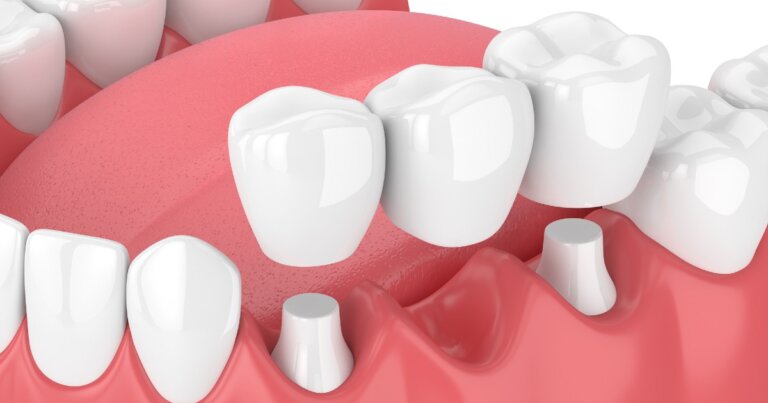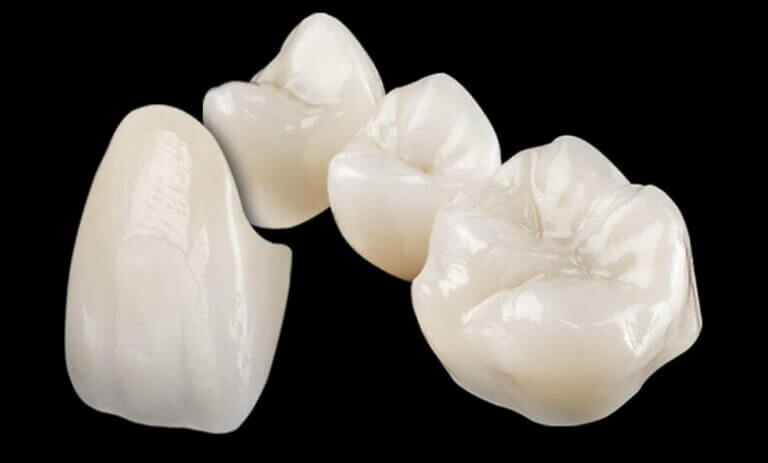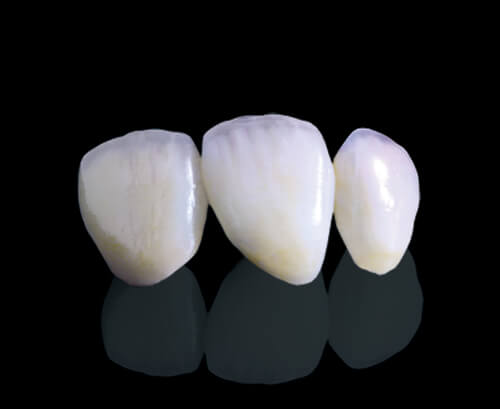Lithium Disilicate Dental Bridge

What Is A Lithium Disilicate Dental Bridge?
A Lithium Disilicate Dental Bridge is a dental restoration that fills the gap left by missing teeth. Lithium disilicate is a durable ceramic known for high strength and excellent fracture resistance, making it a suitable choice for bridges. Its natural appearance blends seamlessly with surrounding teeth, providing both aesthetic and functional benefits.
Before deciding on whether A Lithium Disilicate Dental Bridge are right for you, there are some things you should know:
- Who Needs A Lithium Disilicate Dental Bridge?
- Benefits Of A Lithium Disilicate Dental Bridge
- Alternative To A Lithium Disilicate Dental Bridge
- How Much Does A Lithium Disilicate Dental Bridge Cost?
- Steps In The Lithium Disilicate Dental Bridge Procedure
- Frequently Asked Questions About Lithium Disilicate Dental Bridges
If you have any further questions about A Lithium Disilicate Dental Bridge or other dental services offered at Atlas Dental, please contact us.

Free phone consultation
Are you missing teeth and have questions about Dental Bridges? Schedule a free phone consultation with our GTA dentist.

5 star google reviews
Our patients love us! See why people are choosing Atlas Dental for Dental Bridges.

Book Emergency Bridge visit online
Have a problem with your Dental Bridge? Book An Emergency Dental Appointment Online.
Who Needs A Lithium Disilicate Dental Bridge?
A Lithium Disilicate Dental Bridge may be ideal for:
- Individuals with Missing Teeth: For those missing one or more teeth, this bridge helps restore both aesthetics and chewing function.
- Patients Unable to Receive Dental Implants: For individuals unsuitable for implants due to bone density or medical conditions, a lithium disilicate bridge can be an effective alternative.
- Aesthetically Conscious Patients: Its translucency and color-matching capabilities mimic natural teeth, providing a lifelike result.
- Those Seeking Durability: Lithium disilicate bridges are known for their long-lasting durability and resistance to daily wear.
- Patients Preferring a Minimally Invasive Procedure: Compared to implants, this option often requires less removal of natural tooth structure.
- Individuals with Healthy Surrounding Teeth and Gums: Strong neighboring teeth and healthy gums are essential for bridge support.
Consulting with a qualified dentist can help determine whether a Lithium Disilicate Dental Bridge is the right choice for your dental needs. If you have further questions about Lithium Disilicate Dental Bridges, please contact us.
Benefits Of A Lithium Disilicate Dental Bridge
A lithium disilicate dental bridge has several advantages that make it a popular choice for patients:
- Natural Appearance: Lithium disilicate closely resembles real tooth enamel, creating a seamless look.
- Durability: Known for its strength, this material withstands daily wear and tear.
- Biocompatibility: It is well-tolerated by the body, reducing the risk of allergic reactions.
- Stain Resistance: Lithium disilicate resists staining, keeping your bridge bright and fresh over time.
- Comfort and Functionality: The bridge feels natural in the mouth, allowing you to eat and speak comfortably.
- Fixed Solution: Unlike removable options, a bridge is permanently attached, offering convenience.
- Preservation of Oral Health: It prevents neighboring teeth from shifting, maintaining proper alignment.
- Longevity: With proper care, a lithium disilicate bridge can last over a decade, reducing replacement needs.
Your dentist will evaluate your oral health, discuss your goals, and create a personalized treatment plan that aligns with your needs and preferences.If you have further questions about Lithium Disilicate Dental Bridges, please contact us.

What Are The Alternative Treatments If I Do Not Choose A Lithium Disilicate Dental Bridge?
If a Lithium Disilicate Dental Bridge isn’t right for you, other options include:
- Maryland Bridge: A conservative choice that uses metal or porcelain wings to bond to adjacent teeth.
- Cantilever Bridge: Suitable for cases with only one adjacent supporting tooth, though it may increase stress on the supporting tooth.
- Zirconia Bridge: Offers durability and aesthetic appeal but may require more tooth removal.
- Porcelain Fused to Metal Bridge: Combines metal strength with porcelain aesthetics but may show a metal line at the gum.
- Gold Bridge: Known for durability, gold bridges provide a unique look and longevity.
- Dental Implants: A long-lasting solution involving a titanium post in the jawbone, topped with a natural-looking crown.
- Removable Partial Dentures: These are custom-made and can replace multiple teeth but are removable.
Discussing these options with your dentist will help you make an informed choice based on your needs. If you have further questions about Lithium Disilicate Dental Bridges, please contact us.
Cost of Dental Bridge
The price of a Dental Bridges will depend on the number of pontics and retainer. For example, a 3-unit bridge, for example, would cost $1234+550+1234 plus dental lab fee (approximately $600), which would equal $3618. The codes relevant to dental bridges in the Ontario Dental Association’s Suggested Fee Guide appear as follows:
Pontics, Porcelain/Ceramic/Polymer Glass
- 62501 – Pontics, Porcelain/Ceramic/Polymer Glass Fused to Metal: $550 + Dental Lab Fee
Retainers, Porcelain/Ceramic/Polymer Glass
- 67201 – Retainer, Porcelain/Ceramic/Polymer Glass: $1234 + Dental Lab Fee
Dental bridges are sometimes considered a supplementary service by dental insurance plans and may or may not be covered by your dental insurance. Be sure to find out from your dental insurance plan provider how much you are eligible for before going ahead with dental treatment. Your dentist can help you submit an predetermination to your dental insurance.
For patients without dental insurance, Atlas Dental is pleased to offer dental financing through iFinance Dentalcard. Affordable payment plans start at 7.95% for terms of 6 months to 6 years. To learn more about Dentalcard dental treatment financing, follow this link.
Steps In The Lithium Disilicate Dental Bridge Procedure
Here’s an overview of the typical lithium disilicate dental bridge procedure:
- Consultation: Your dentist will assess your needs and discuss options.
- Treatment Planning: A customized treatment plan is created based on the bridge’s design and shade.
- Tooth Preparation: Neighboring teeth are prepared to support the bridge.
- Impressions & Shade Matching: Dental impressions and shade matching ensure a precise fit and natural look.
- Temporary Bridge Placement: A temporary bridge may be placed while the permanent one is fabricated.
- Bridge Fabrication: Skilled technicians craft the bridge in a dental lab.
- Bridge Placement: The dentist checks fit and comfort, making any necessary adjustments.
- Cementation: The bridge is permanently bonded to the supporting teeth.
- Aftercare Instructions: Your dentist provides detailed home care guidelines to extend the bridge’s lifespan.
By following these steps and collaborating closely with your dentist, you can expect to achieve a restored smile that enhances both your appearance and your overall quality of life. If you have further questions about Lithium Disilicate Dental Bridges, please contact us.

Frequently Asked Questions About Lithium Disilicate Dental Bridges
- What is the typical lifespan of a lithium disilicate dental bridge?
With proper care, these bridges can last between 10 to 15 years or longer.
- How should I care for my lithium disilicate bridge?
Maintain good oral hygiene by brushing and flossing daily, and attend regular dental check-ups to ensure the longevity of the bridge. Read our dental bridge post-insertion instructions.
- Is the procedure for getting a lithium disilicate bridge painful?
The procedure is typically performed under local anesthesia, minimizing discomfort during preparation and placement.
- Can a lithium disilicate bridge stain over time?
Lithium disilicate bridges are highly resistant to staining due to their non-porous surface, but maintaining proper oral hygiene is essential to keep them looking their best.
Lithium disilicate dental bridges offer a durable and aesthetically pleasing solution for replacing missing teeth, ensuring both functionality and a natural appearance. If you have further questions about Lithium Disilicate Dental Bridges, please contact us.

